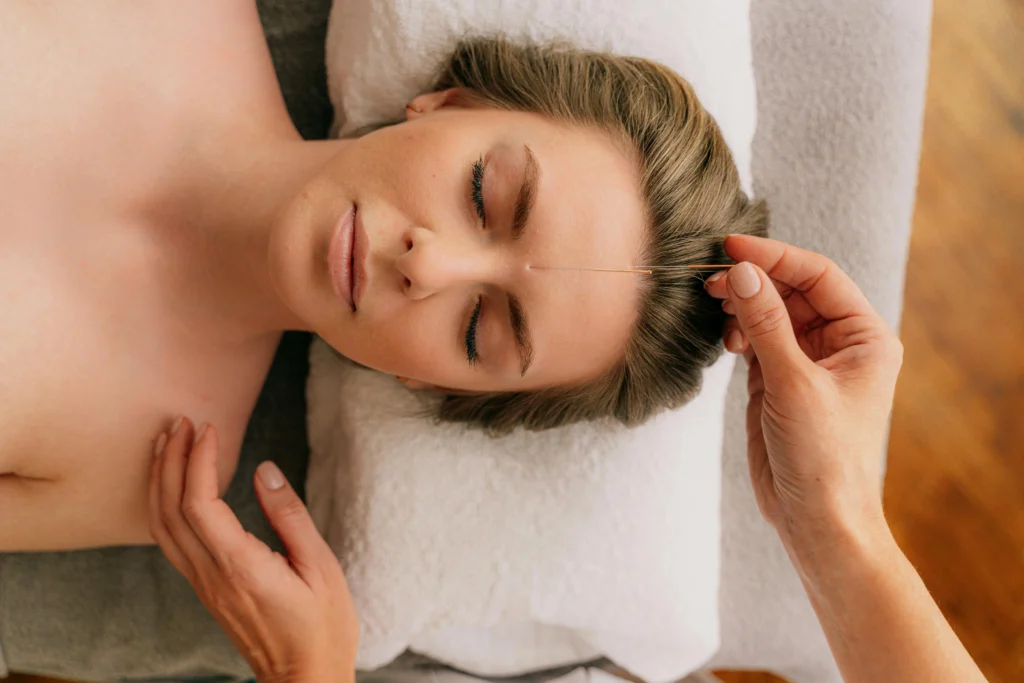Obsessive-Compulsive Disorder, or OCD, is a serious mental illness with wide ramifications on daily living.
Various complementary therapies, apart from conventional treatments like CBT or medication, are available.
Acupuncture, a branch of traditional Chinese medicine, has recently gained interest in modern times as a supportive therapy that can be used alongside OCD.
These therapies often fall under a holistic approach to OCD, aiming to address both the physical and mental aspects of the condition.
Here, we will explore acupuncture and other therapies used in an attempt to lower symptoms of OCD, helping to improve overall mental well-being.1
Get Help for OCD at Cornerstone
Explore residential, outpatient, and virtual pathways to mental health recovery in Arizona.

What is Obsessive Compulsive Disorder?
OCD is a mental health disorder that primarily involves recurring unwanted thoughts or obsessions, which provoke anxiety, and compulsions or actions, which are typically repeated in an attempt to decrease anxiety.
For instance, obsessive fears of infection, or “germophobia,” could accompany compulsions of frequent hand-washing or organization.
Although the exact causes of OCD remain unclear, recent studies have identified the points of interaction between endogenous, neurobiological, and environmental factors. OCD is extremely distressing to live with and interferes with relationships, work capabilities, and everyday functioning.
For many, treatment is the only way of achieving symptomatic relief, emotional stability, and a rewarding lifestyle.
Current OCD Treatments
The most common available treatments for OCD are:
- Cognitive behavioral therapy, which focuses on becoming aware of and confronting negative thought patterns.
- Exposure and Response Prevention, a special kind of CBT that involves the gradual exposure to fear along with the prevention of compulsive response.
- Medication, often involving the prescription of SSRIs, which regulate the chemicals in the brain.
Although these treatments have worked for most people, some have sought additional alternative treatments to complement more conventional treatments.2
What is a Holistic Approach to OCD?
A holistic approach to OCD looks at the treatment of the whole person, body, and spirit rather than just the symptoms.
It may incorporate various other complementing techniques besides conventional treatments to get better results emotionally and mentally.
Essential components of the comprehensive approach to OCD include:
- Acupuncture, which can help restore balance and relieves anxiety.
- Mindfulness activities, such as meditation and yoga.
- Lifestyle modifications, including nutrition and an increase in exercise.
- Art expression and elaboration of feelings.
- Natural medications, such as herbal supplementation, are consumed under professional recommendation.
These components may concern different features of health and, therefore, contribute to the improvement of mental health in general and ensure long-term recovery.3
Quick Tip: Bringing Mindfulness into Daily Life
You can incorporate small mindfulness exercises into your day. For instance, deep breathing or grounding techniques can help support a more holistic approach to dealing with OCD. These light practices can reduce anxiety and keep obsessive thoughts at bay, therefore supporting acupuncture treatments and other therapies.
How Acupuncture Works
In acupuncture, according to traditional Chinese medicine, slender needles are inserted into certain crucial points along the human body to restore the balance of energy within the body.
This age-old technique triggers activity in the nervous system, influencing the natural flow of vital energy or Qi and thereby stimulating it.
The core components of acupuncture include:
- Energy flow: this is where Acupuncture aims to restore disturbed energy flow that could be responsible for physical or mental disorders.
- Target point: Specific points are associated with specific areas of concern, either physically or emotionally.
- Impact on the body: Nervous system effects, thanks to the stimulating effects of acupuncture, include the release of endorphins and a modulated stress response, which supports relaxation and mental clarity.
This practice offers a natural way to address anxiety, a common symptom of OCD.
Can Acupuncture Help with OCD Symptoms?
Though Acupuncture may not be considered a cure for OCD, it can help deal with its symptoms by reducing anxiety and helping you relax.
Acupuncture has also been said to relax the nervous system, normalize the stress hormone, and promote emotional well-being.
The potential benefits of acupuncture for OCD may include:
- Feeling anxiety and tension dissolve, little by little
- A break from obsessive thinking and intrusive mental patterns
- An improvement in your general psychological well-being, thanks to increased relaxation and improved concentration.
One 2019 study published in the Journal of Affective Disorders indicates that acupuncture relieves symptoms of anxiety and improves sleep, another very important component in the treatment of OCD.⁴
While more research is needed, some studies support acupuncture as a complementary therapy that holds great promise.
Integrating Holistic Approaches with Traditional OCD Treatment
The combination of alternative therapies like acupuncture with conventional methods supports the comprehensive management of OCD.
For example, acupuncture may improve the effectiveness of CBT because this treatment can decrease anxiety and thus make a person more open to the therapy itself.
Working with licensed professionals will ensure a safe and effective care plan that addresses your unique needs.
This integrative approach to care fosters comprehensive treatment regarding both symptoms and causes of OCD.
Frequently Asked Questions
Can acupuncture cure OCD?
By itself, acupuncture cannot cure OCD, but the treatment can reduce the symptoms associated with anxiety and stress. That said, the symptomatic relief can soothe the patients as an addition to conventional therapies and medication. The process enhances holistic care through the increased general mental well-being of the patient.
How often should someone with OCD get acupuncture?
The number of acupuncture sessions usually differs depending on the situation, but often, it needs to be determined by the practitioner. It is often advisable to start with a course of weekly treatments, as this allows gradual improvement. It’s important to discuss your plan of action with a healthcare professional to ensure it fits your unique needs.
Is acupuncture covered by insurance for OCD treatment?
Insurance coverage for acupuncture as a treatment for OCD depends on the provider and individual plans. Some insurance companies may cover acupuncture for specific conditions, but this varies, so it’s best to review policy details. Contact your insurance provider for details specific to your coverage.
Key Takeaways
- Key Takeaways
- Alternative therapies in a more holistic approach to OCD will involve acupuncture, mindfulness, and a change in lifestyle.
- Acupuncture has helped manage symptoms related to OCD through the reduction of anxiety and balancing brain chemistry.
- Integrating holistic methods into the treatment process could elevate mental health outcomes.
- The holistic approach addresses the patient's needs individually with emotional support.
- At Cornerstone Healing Center, individuals seeking holistic treatments for OCD can find valuable resources and expert guidance.
Embrace a Holistic Approach to OCD Management
Adding acupuncture to a patient’s care allows us to approach their health on multiple levels, supporting long-term emotional well-being.
It can be a powerful tool, especially when combined with traditional OCD treatments.
At Cornerstone Healing Center, our online OCD treatment program takes a whole-person approach, integrating evidence-based therapies with complementary treatments to help you regain control and find lasting relief.
If you have any questions about how we can support your journey or would like to schedule an appointment, don’t hesitate to contact us today!



